In today’s world, the push toward eco-conscious choices has made sustainable living with moringa more relevant than ever. Known as an eco-friendly super food, moringa offers incredible nutritional value while supporting the planet through low-impact farming. Its ability to thrive in harsh climates with minimal resources makes moringa farming sustainable, and its rich nutrient profile supports plant-based sustainability. As we seek smarter ways to live and eat, moringa emerges as a powerful ally in building a healthier lifestyle and a greener future.
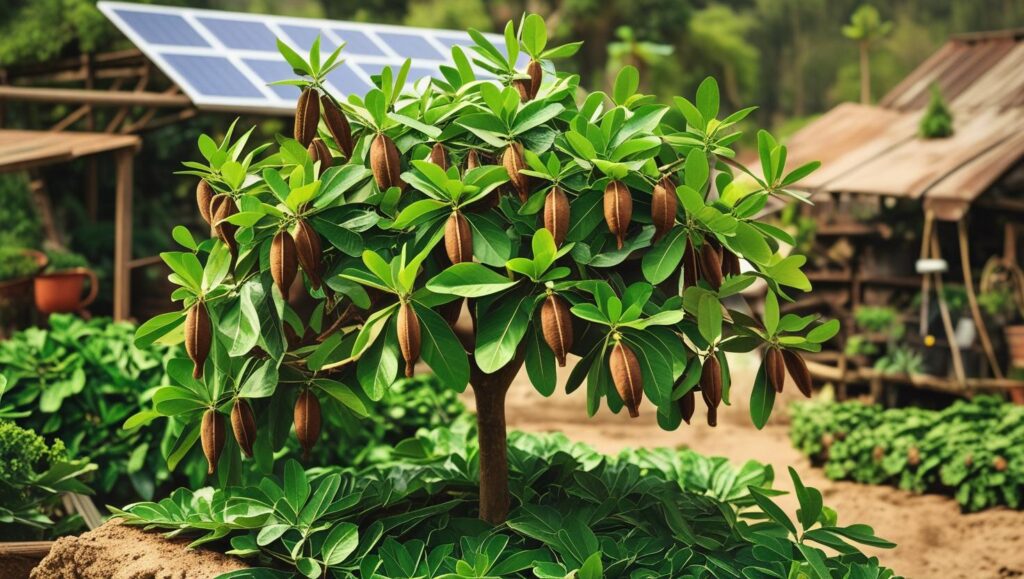
Moringa and Its Role in Sustainable Living
In a world grappling with climate change, food insecurity, and overconsumption, sustainability has become more than just a buzzword—it’s a necessity. As we search for eco-friendly solutions that also nourish our bodies, moringa has emerged as a powerful ally.
Often referred to as the “Miracle Tree,” moringa supports sustainable living on multiple fronts: from enriching diets to improving soil health, supporting small farmers, and reducing environmental impact. In this article, we explore moringa’s role in sustainable living, and why this humble plant is gaining global recognition.
🌿 What is Moringa?
Moringa oleifera is a fast-growing, drought-resistant tree native to South Asia and Africa. It thrives in arid climates, requires minimal resources, and provides nutrition from nearly every part of the tree—leaves, pods, seeds, and roots.
Known for its high nutritional value, moringa has been used in traditional medicine for centuries. But beyond personal health, its benefits extend to community resilience and environmental preservation.
🌱 1. Moringa as an Eco-Friendly Superfood
When we talk about eco-friendly superfoods, moringa ticks every box. Here’s why:
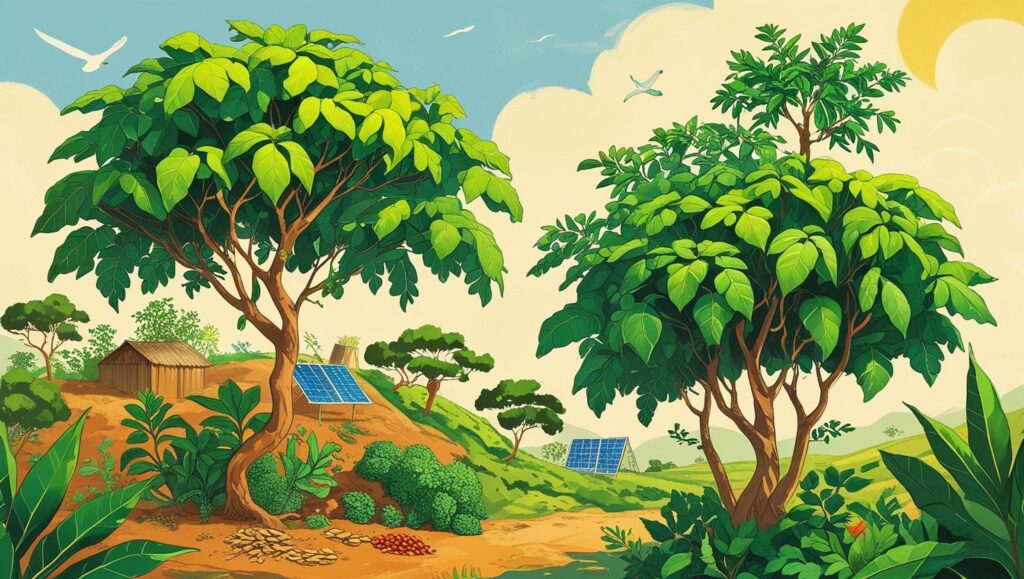
✔️ Grows in Harsh Conditions
Moringa thrives in poor soil and dry environments, making it ideal for areas affected by climate change. It requires very little water compared to crops like spinach or kale.
✔️ High Yield, Low Input
A single moringa tree can produce leaves year-round, with minimal fertilizer or pesticide needs. This reduces the carbon footprint and reliance on synthetic chemicals.
✔️ Whole-Plant Use
From leaf to root, nearly every part of moringa is usable—for food, medicine, oil, or animal feed. This zero-waste profile reduces agricultural waste and maximizes land productivity.
🧑🌾 2. Moringa Farming and Economic Sustainability
Beyond the environment, moringa supports economic sustainability, especially in developing countries.
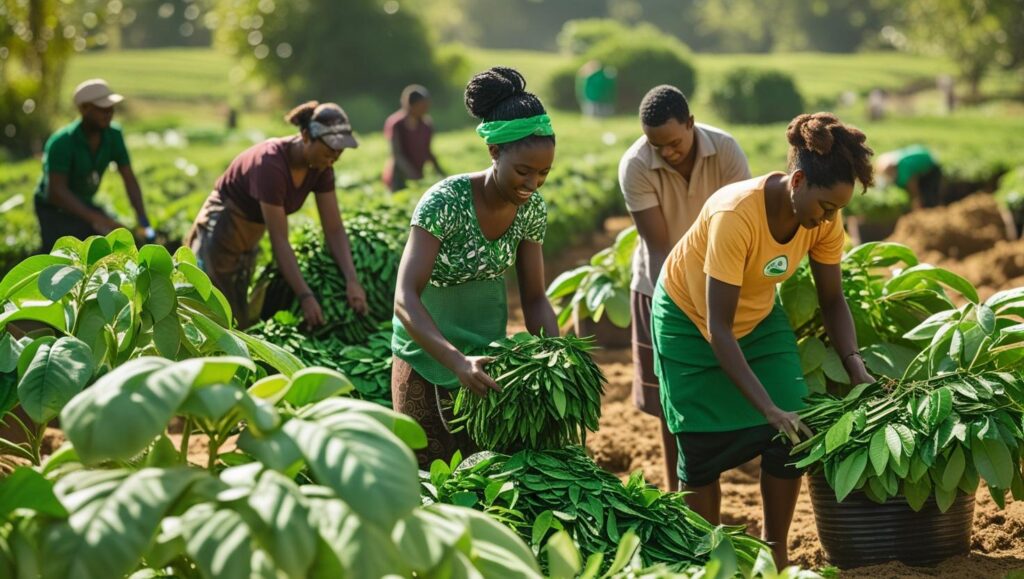
🌍 Support for Small Farmers
Moringa is increasingly grown in parts of Africa, South Asia, and Latin America. Its cultivation supports smallholder farmers, often providing income for women-led cooperatives and rural communities.
💼 Job Creation
From planting and harvesting to processing and export, the moringa supply chain creates sustainable jobs—particularly in regions where economic opportunities are limited.
💸 Low-Cost Nutritional Security
In areas affected by malnutrition, moringa offers affordable access to essential nutrients, helping communities become more self-reliant and less dependent on expensive imports.
🍽️ 3. Plant-Based Nutrition for a Sustainable Diet
Sustainable diets prioritize plant-based, low-impact, and nutrient-dense foods. Moringa is a champion in all three areas:
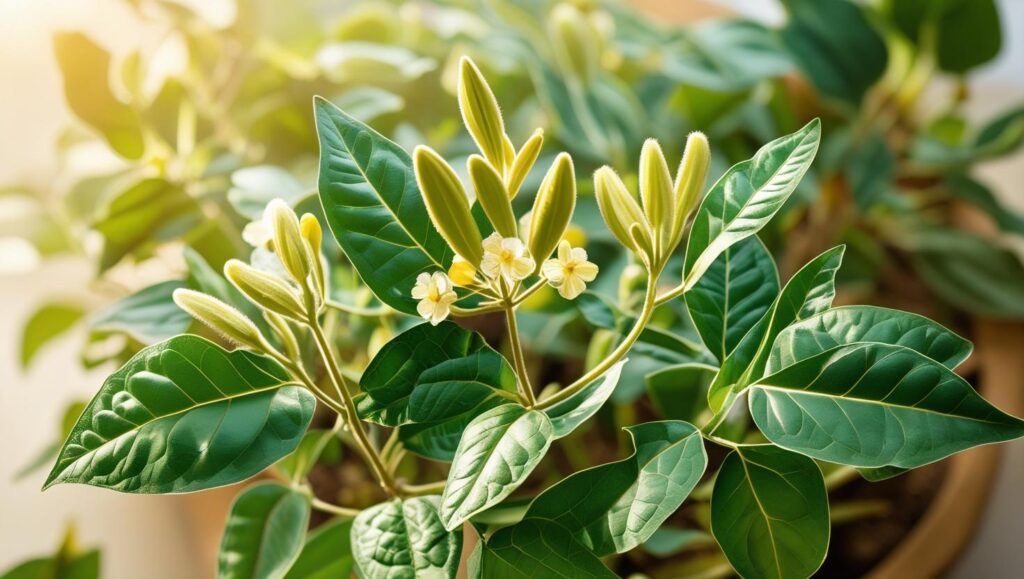
- High in plant-based protein: Contains all nine essential amino acids.
- Rich in nutrients: Calcium, iron, potassium, magnesium, and vitamins A & C.
- Reduces need for supplements: One tablespoon of moringa powder often covers several daily requirements.
By incorporating moringa into sustainable diets, individuals reduce reliance on resource-heavy animal products while meeting nutritional needs efficiently.
🌾 4. Moringa’s Role in Soil and Ecosystem Health
Healthy ecosystems are the backbone of sustainability. Moringa contributes by:
🌿 Preventing Soil Erosion
Moringa roots stabilize the soil, making it an excellent plant for reforestation and erosion control projects.
🌱 Natural Fertilizer and Pesticide
Moringa leaves can be used as green manure, enriching the soil with organic matter. Its seeds also contain compounds that can act as natural pesticides and water purifiers.
🐝 Supports Biodiversity
As a flowering tree, moringa attracts pollinators and supports surrounding flora and fauna.
🌍 5. Water Purification with Moringa Seeds
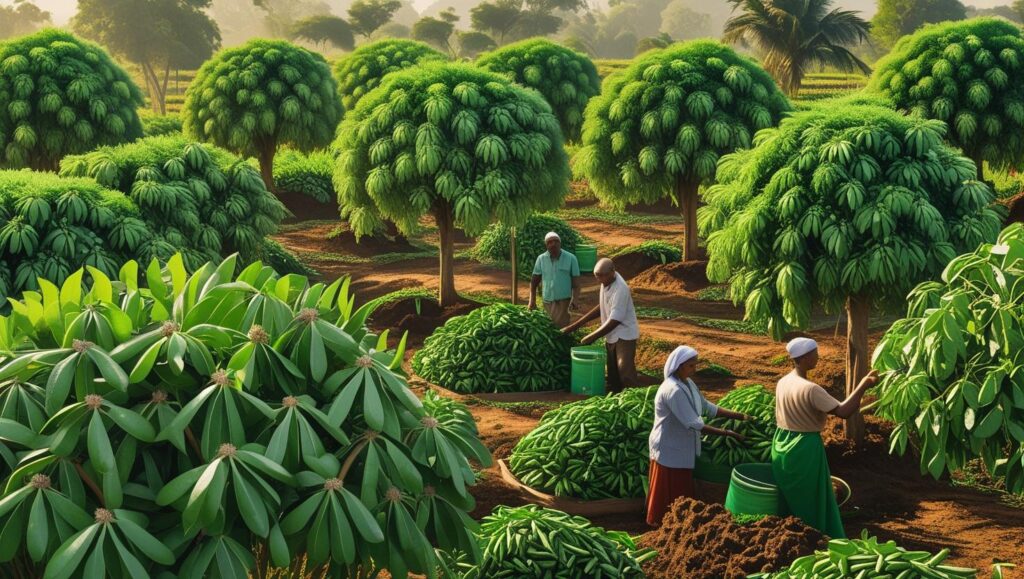
In many regions, access to clean water is a daily struggle. Moringa seeds have unique properties that help:
- Coagulate dirt and bacteria in water
- Reduce harmful microbes
- Provide a natural, low-cost water purification method
This application is especially useful in rural and disaster-stricken areas, aligning moringa with the UN’s Sustainable Development Goals (SDGs).
♻️ 6. Moringa in the Circular Economy
The circular economy is about minimizing waste and making the most of resources. Moringa fits perfectly:
- Leaves: Eaten fresh, dried, or powdered
- Seeds: Used for oil, animal feed, or water purification
- Husks and stems: Composted or turned into biofuel
Very little goes to waste in moringa farming—making it a model for plant-based sustainability.
🌐 7. Moringa and Global Food Security
According to the FAO, global food production must increase by 60% to feed the growing population by 2050. Moringa’s role in this includes:
- Boosting nutrition in poor communities
- Providing year-round food security
- Growing in regions where other crops fail
This makes moringa farming sustainable and essential in future global food strategies.
🥄 How to Include Moringa in a Sustainable Lifestyle
Ready to adopt moringa into your own sustainable routine?
💡 Simple Tips:
- Add moringa powder to smoothies or oatmeal.
- Drink moringa tea instead of coffee.
- Use moringa oil for cooking or skin care.
- Support eco-conscious brands that ethically source moringa.
By making these small changes, you support both personal health and planetary wellness.
❓ FAQ: Moringa and Sustainable Living
1. Why is moringa considered a sustainable crop?
Moringa is drought-tolerant, grows quickly, requires minimal resources, and offers high nutritional value. Its whole-plant usability makes it a low-waste, high-impact solution for sustainable agriculture.
2. How does moringa support eco-friendly living?
Moringa supports eco-friendly living by replacing resource-heavy foods with plant-based nutrition, enriching soil, preventing erosion, and even purifying water. It contributes to environmental, social, and economic sustainability.
3. Can moringa help reduce my carbon footprint?
Yes. Consuming locally-sourced moringa reduces transportation emissions, and choosing plant-based options like moringa instead of meat significantly lowers your dietary carbon footprint.
4. Is moringa good for vegan or plant-based diets?
Absolutely! Moringa is rich in protein, iron, calcium, and antioxidants—nutrients often sought in plant-based diets. It’s a versatile and complete addition to vegan meals.
5. How does moringa contribute to food security?
Moringa offers year-round harvests, grows in tough climates, and provides essential nutrients—making it ideal for communities facing food scarcity and malnutrition.
✅ Conclusion: A Tree That Nurtures People and the Planet
Moringa is more than just a health supplement—it’s a sustainable solution. From nourishing your body to restoring ecosystems and empowering communities, it proves that one plant can have a global impact.
Whether you’re a conscious consumer, a health enthusiast, or a sustainability advocate, incorporating moringa into your lifestyle is a small act with big benefits.

Leave a Reply